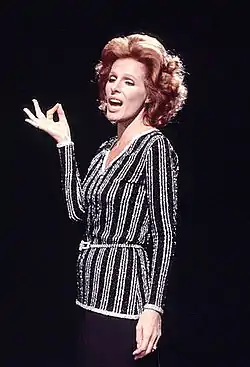Ornella Vanoni
Ornella Vanoni OMRI (Italian pronunciation: [orˈnɛlla vaˈnoːni]; born 22 September 1934) is one of the most credited pop singers of Italy.[1][2] She is known for her sophisticated pop style.[1]
Ornella Vanoni | |
|---|---|
 Vanoni in the 1960s | |
| Background information | |
| Birth name | Ornella Vanoni |
| Born | 22 September 1934 |
| Origin | Milan, Italy |
| Genres | Pop, jazz |
| Occupation(s) | Singer, actress |
| Years active | 1960–present |
| Associated acts | Gino Paoli |
| Website | Ornellavanoni.it |
Artistic career
She started her artistic career in 1960 as a theatrical actress of Bertolt Brecht works, under the direction of Giorgio Strehler in his Piccolo Teatro of Milan. At the same time, she started singing, recording for a high-class public. The folklore and popular songs she reinvented in her recordings of this period, especially the ones that sang about the criminal underworld, gave her the nickname cantante della mala ("Underworld Singer").
Owing to the songs "Senza Fine" and "Che cosa c'è" written for her by Gino Paoli, her popularity rose in 1963. Next year, she won the Festival of Neapolitan song with "Tu si na cosa grande". L In the following years, she took part in a series of Festivals of Italian song in San Remo, which resulted in great successes with the songs; "Abbracciami forte" (1965), "Io ti darò di più" (1966), "La musica è finita" (1967), "Casa Bianca" (1968), and "Eternità" (1970). "Casa Bianca", which came second, was the subject of a copyright dispute between the composer Don Backy and the Clan Celentano label.
Later in the period, Vanoni released the hits "Una ragione di più", "Un'ora sola ti vorrei", and "L'appuntamento". "Non Dirmi Niente" is Vanoni's cover of Burt Bacharach's hit "Don't Make Me Over". "L'appuntamento", which was composed in 1970, is a cover of the Brazilian song "Sentado à Beira do Caminho" (Sitting by the Roadside) by Erasmo Carlos and Roberto Carlos.[3] In 1972 she sang the theme to Lucio Fulci's critically accalimed mystery thriller film Don't Torture a Duckling.
In 1976, Vanoni cooperated with Vinicius de Moraes and Toquinho releasing the hit "La voglia, la pazzia, l'incoscienza e l'allegria". During the 1980s, she released "Ricetta di donna", "Uomini", and "Ti lascio una canzone" (a duet with Gino Paoli). In 1989, she returned to Sanremo Festival with the song "Io come farò". In 1999, she recorded "Alberi", a duet with Enzo Gragnaniello. She was mostly active performing live and as a guest singer in recordings. In 2004, she released a duo album with Gino Paoli to celebrate her 70th birthday.
In addition to her singing career, Ornella Vanoni was active in other arts, starring in stage and TV shows, movies, and posing nude for the Italian edition of Playboy magazine. The inclusion of her former hit "L'Appuntamento" (1970) on the Ocean's Twelve soundtrack sparked a worldwide renewal of interest in Ornella Vanoni.
Discography
|
|
Filmography
| Year | Title | Role | Notes |
|---|---|---|---|
| 1959 | Ragazzi del Juke-Box | Barmaid | Cameo appearance |
| 1961 | Duel of the Titans | Tarpeia | |
| 1962 | Invasion 1700 | Woman | Cameo appearance |
| 1964 | Amori pericolosi | Prostitute | Segment: "La Ronda" |
| I ragazzi dell'Hully Gully | Singer | Cameo appearance | |
| 1966 | Per un pugno di canzoni | Singer | Cameo appearance |
| 1971 | Il mulino del Po | La Sniza | Television film |
| 1979 | I viaggiatori della sera | Nicki | |
| 2015 | What a Beautiful Surprise | Carla |
References
| Wikimedia Commons has media related to Ornella Vanoni. |
Much of the content of this article comes from the equivalent Italian-language Wikipedia article (retrieved 28 March 2006).
- Carrera, Alessandro (2001). "Folk music and popular song from the nineteenth century to the 1990s". In Zygmunt Guido Baranski, Rebecca J. West (ed.). The Cambridge Companion to Modern Italian Culture. Cambridge University Press. pp. 325–336.
- Ornella Vanoni: da oggi in radio il singolo con Carmen Consoli (In Italian). FullSong.it. Retrieved 10 February 2009
- "Comparison page".
